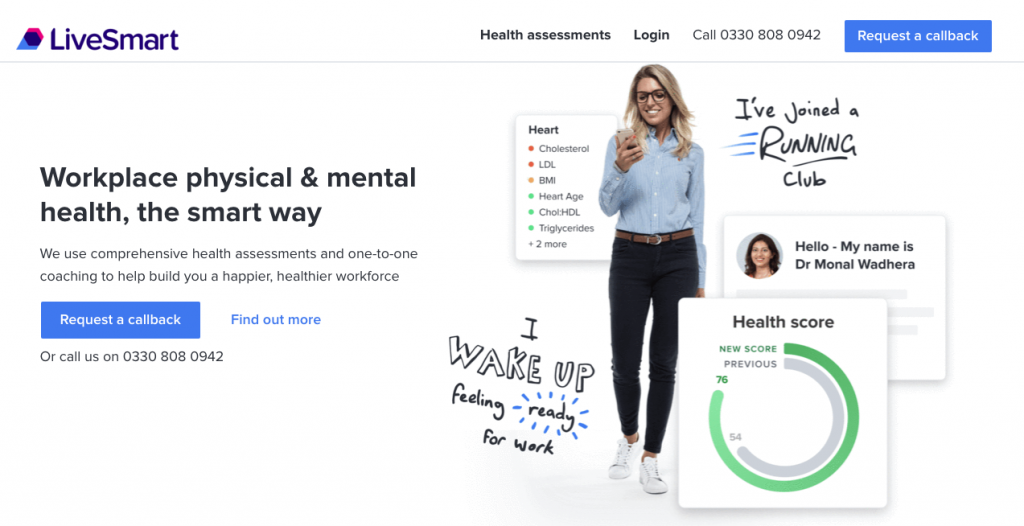
Team Raw Energy has joined with LiveSmart, a cutting edge organisation who offer private blood markers screening tests for people just like us, who want to take an active role in their wellbeing.
So why should you be interested in having your ‘bloods done’? Here are four good reasons that Live Smart guest blogger Luke Jones is writing about .
Luke’s shared his knowledge with LiveSmart so that more people can understand the importance of getting regular blood markers measured to monitor health, so we can be better educated and make the right decisions about how we want to live.
Heres what he’s got to say:
![]() We live in an amazing world where we can now track everything from the health of our heart to the status of our kidneys – all from a few drops of blood in a test tube.
We live in an amazing world where we can now track everything from the health of our heart to the status of our kidneys – all from a few drops of blood in a test tube.
It’s important to consider health from a holistic standpoint, and specific blood metrics will be more applicable depending on the situation and the current health status of the individual.
But, if we’re looking things from a big picture/longevity perspective, you could argue that there are certain markers that are more applicable than others – ones that are more closely related to living a longer life.
If you’re someone who’s looking to do just that (let’s face it – who isn’t?), here are some of the most important blood markers to keep your eye on.
1. Cholesterol
You’ve no doubt heard about the controversy surrounding cholesterol – a fatty substance produced by the liver but also found in the diet through animal products. Some argue that there’s no relationship between high cholesterol levels and heart disease, whilst others point towards the evidence suggesting the opposite.
The NHS tends towards the latter, suggesting that you limit sources of cholesterol in the diet and keep total cholesterol levels lower than 4-5 mmol/l.
But what about the specific types of cholesterol?
Numerous studies have shown links between low LDL levels (often named ‘bad cholesterol’) and increased longevity, and the NHS recommends keeping them less than 2-3 mmol/l.
HDL is another story. A study of centenarians in New York in the 1990’s showed that those with higher HDL levels (good cholesterol) tended to live longer and were healthier in their old age.
How do you get a balance between the two?
Some people will have a genetic predisposition, but eating healthily, moving often, and keeping your stress levels under control can definitely make a difference.
2. Vitamin D
Contrary to popular belief, vitamin D isn’t just for building strong bones…
It is also involved in hormone regulation, and may even offer a protective effect against multiple diseases including auto-immune diseases and certain types of cancer.
Opinions vary, but blood levels of above 50 nmol/l of total 25-hydroxyvitamin D are thought to be adequate, although some suggest that higher levels are favourable.
In the UK, getting enough vitamin D from the sun isn’t all that easy, which is why the government recently recommended that everyone should be taking a supplement during the winter months.
And it should pay dividends. In fact, one study showed that supplementation caused a reduced risk of all cause mortality by 7%.
Just be wary:
Is possible to overdo it with vitamin D supplements as it is a fat soluble vitamin, so be sure to get your levels checked regularly.
3. C- Reactive Protein
C-Reactive Protein is a protein synthesised by the liver, and acts as one of the primary markers used to detect inflammation in the body.
As you’re more than likely aware, chronic inflammation is thought to be the underlying cause of numerous degenerative diseases, including heart disease, auto-immune conditions, and even forms of cancer.
Levels less than 5 mg/l are what you’ll want to aim for (although expect them to naturally shoot up after a heavy bout of exercise).
How do you keep them under control long term?
Again, controlling your stress levels, moving often, and eating a nutrient dense diet are all great places to start.
4. Omega 6:3 ratio
The omegas are types of essential fatty acids, meaning that our body cannot synthesis them and we therefore need to acquire them through dietary means.
Omega-3’s get most of the limelight, found in algae, flax, chia seeds and fish. Studies have shown that maintaining an optimal level of them in the blood can slash your risk of premature death by 85%.
But the ratio between omega 6:3 fatty acids may be just as important, if not more so.
A 2002 review study concluded that “A lower ratio of omega-6/omega-3 fatty acids is more desirable in reducing the risk of many of the chronic diseases of high prevalence in Western societies, as well as in the developing countries, that are being exported to the rest of the world”.
Shoot for as close to 2:1 (6:3) as you can by including plenty of the foods mentioned above, and cutting back on vegetable oils, margarine, and even sunflower seeds.
Not sure what your metrics look like?
Order your LiveSmart test today to get clued up on your health.

Article republished with permission from LiveSmart.
Look out for other articles on tracking health and measuring wellbeing on our website –
and in our weekly blog posts. It’s a hot topic for us here at Raw Energy.
Lawrence is a qualified Health Coach and can help you transition to an eating plan and lifestyle that best suits you. To get in touch, contact him here.
PS : To receive free tips nuggets of wellbeing wisdom by email, sign up for our Healthy Habits Ezine.








